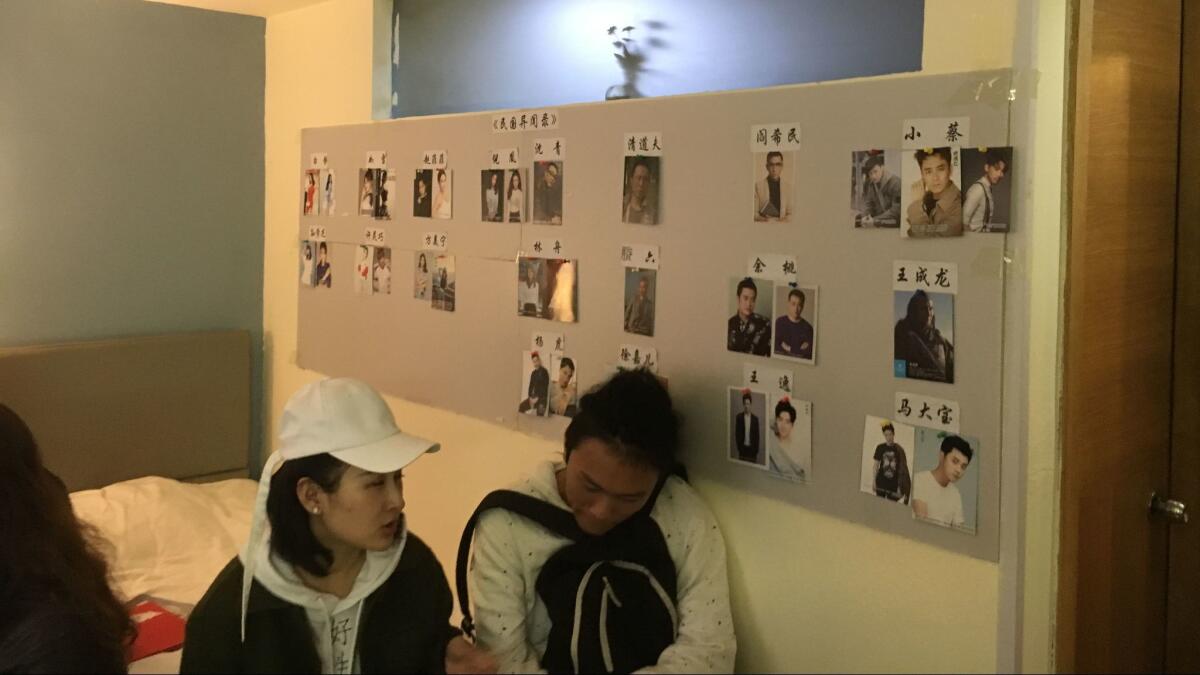A Beijing hotel was the epicenter of China’s online film industry — but that’s changing

- Share via
Reporting from BEIJING — Sitting on a white twin bed, Yi Yao handed the casting director a packet of glamour photos and her acting portfolio. Like dozens of other aspiring actors, Yi had come to an obscure, red-brick hotel in east Beijing for a fleeting shot at the big screen.
Well, not that big. A computer screen. And these days, her chances of getting a role are slimmer than ever.
For years the Floating Home hotel has been the undisputed hub of China’s $150-million online film industry. The industry’s predominantly low-budget films, with costs rarely exceeding $150,000, used Floating Home as their all-purpose marketing department, casting office and studio headquarters. Studios rented a room, placed a flier in the lobby, then propped open the bedroom door. Actors wandered the halls looking for a match.
Now that industry is changing: China’s online film market is growing, revenue from subscription services is up and major studios are increasingly paying attention to this obscure corner of China’s multibillion-dollar film industry. For online viewers, greater investment has meant more movies with higher quality. But for Floating Home’s low-budget studios and inexperienced actors, growth has been a mixed blessing. Consumers are gravitating toward flashy big-budget films. Floating Home’s low-budget films — and the actors who feature in them — are struggling to survive.
“The quality here isn’t great,” said Yi, 22, loitering in the Floating Home lobby with her agent, Zhong Xu, 31. Like many of Floating Home’s actors and actresses, she has higher ambitions than B-list internet movies. “But you can’t rule them all out. There are still some good ones.”

On a Thursday afternoon, a ragtag group of actors gathered in the hotel lobby, craning to study the audition lists. Zhong took pictures of the rooms he wanted to visit: “The Strange Record of Republican China,” “Holy Land,” “Alliance of Heroes.” One poster depicted an alien spaceship abducting a figure from Beijing’s Forbidden City. “After the Emperor Disappeared,” read the English translation. Zhong snapped a picture.
In the early days of online-only film and TV dramas, China’s censorship regime — focused on big-budget films and mass-audience TV shows — largely ignored Floating Home’s B-list productions. As a result, online-only studios, though they self-censored to stay on the authorities’ good side, produced a dizzying array of content: zombie monk films, vulgar comedies, quasi-pornographic erotic movies. Industry insiders borrowed a pingpong term to describe how they skirted the boundaries of permissible speech. Just as pingpong players hit shots that clip the corner of the table while remaining in play, these studios were playing “edgeball.”
“The censors are always one step behind,” said Stanley Rosen, a USC professor who studies the Chinese film industry. “Online films are a fast-moving target.”
In 2016, online films broke into the mainstream. The industry grew by more than 1,000%, churning out an astonishing 2,200 movies, or more than six a day. Major studios began eyeing the viewership numbers, which exceeded 200 million in some cases. As the big studios got involved, high-quality professional content began appearing on video-streaming websites such as iQiyi and YouKu. Low-budget films got nudged to the side.
“Anyone who says online movies are low-class,” quipped the headline of a recent iQiyi news story, “is obviously not watching online movies.”
As the industry grew, the censors began paying attention. Stricter censorship guidelines came into effect in March. In June, as President Xi Jinping oversaw a movement to tighten ideological controls across China, Beijing issued a new regulation requiring all online films to submit to “double approval”: Censors must approve the script before shooting commences, then approve the video before it is broadcast.
“Because some online programs have manifested distorted values, hedonism, inferior quality, vulgar content, debased style, and indiscrete language … strengthened guidance is urgently needed,” the regulation read.
Quantity is down, quality is down. That’s basically it.
— Talent agent Zhong Xu
With greater investment and increased censorship, the online film industry has begun to look more like the Chinese film industry overall. Budgets occasionally reach the $1-million mark, the minimum for most box-office movies. Bigger-budget films also gobble up most of the revenue; in 2016, the top 500 internet films attracted more than 80% of all total views. The remaining 1,700 films split 20% among them.
At the same time, fewer films are playing edgeball. Gone are the days of zombie monks and erotic films. In 2016, nearly two-thirds of all films were comedies or love stories.
“Online films are more professional now, less creative,” said Liu Yalan, co-founder of San Sheng, a media organization covering China’s entertainment industry. “Money is changing the rules of the game.”
Though no one is sure how Floating Home became the industry mecca, Liu guesses its location played a role. The hotel is in Beijing’s Chaoyang district, not far from the Communication University of China, a source of industry talent. Other, larger studios are nearby.
Location may no longer be enough. The new titans of the online film industry, major studios such as Huayi Bros. or iQiyi’s production arm, invest huge resources and expect big returns. These studios cultivate a dedicated stable of actors to cast in films. They don’t take risks on unknown actors whom they met in a Beijing budget hotel.
“Professional circles still rely on a strong internal social network in creating the new generation of directors or actors,” said Wu Jing, a professor in the School of Journalism at Peking University.
Less-than-professional circles, such as Floating Home’s low-budget films, struggle to compete. The hotel has seen a decline in studios renting rooms. Movie posters linger for weeks, advertising tryouts for films that have long since departed. To save money, some studios even forgo Floating Home entirely, opting to find new actors via social media.
“Websites will have their own stars, they will have their own studios,” said Liu, describing the future of the industry. “The value of Floating Home will be less and less.”
Outside Floating Home’s front portico, Zhong lighted a cigarette and stared down at his phone. For Zhong, film is a second career. He sailed the South China Sea for nearly a decade on a commercial fishing boat, learning bits of English from his Philippine shipmates. He became an agent because he liked the hours and the work and had a friend in the industry. Today his maritime past is invisible, save for puka shell hair clips embedded in his mane of dreadlocks.
“Quantity is down, quality is down,” said Zhong, reflecting on the declining fortunes of Floating Home. “That’s basically it.”
Night had fallen. Zhong and Yi said goodbye on Floating Home’s front stoop.
“Three to five new studios still arrive per week,” Zhong said. “It’s still worth coming here.”
Today’s work was over, however. He walked to the subway. Beijing’s Central Business District glittered behind him, its riches just out of reach.
ALSO
China’s ‘sexy cyborg’ took on Silicon Valley bro culture — and won
How the humble KitKat conquered Japan with ever-changing flavors. Anyone for sushi KitKat?
DeButts is a special correspondent.
More to Read
Sign up for Essential California
The most important California stories and recommendations in your inbox every morning.
You may occasionally receive promotional content from the Los Angeles Times.








